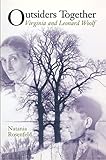Outsiders Together : Virginia and Leonard Woolf / Natania Rosenfeld.
Material type: TextPublisher: Princeton, NJ : Princeton University Press, [2001]Copyright date: ©2000Edition: Course BookDescription: 1 online resourceContent type:
TextPublisher: Princeton, NJ : Princeton University Press, [2001]Copyright date: ©2000Edition: Course BookDescription: 1 online resourceContent type: - 9780691089607
- 9781400823666
- online - DeGruyter
- Issued also in print.
| Item type | Current library | Call number | URL | Status | Notes | Barcode | |
|---|---|---|---|---|---|---|---|
 eBook
eBook
|
Biblioteca "Angelicum" Pont. Univ. S.Tommaso d'Aquino Nuvola online | online - DeGruyter (Browse shelf(Opens below)) | Online access | Not for loan (Accesso limitato) | Accesso per gli utenti autorizzati / Access for authorized users | (dgr)9781400823666 |
Frontmatter -- Contents -- Acknowledgments -- Abbreviations -- INTRODUCTION: Border Cases -- Chapter I. Strange Crossings -- Chapter II. Incongruities; or, The Politics of Character -- Chapter III. Links into Fences -- Chapter IV. Translations -- Chapter V. Monstrous Conjugations -- Notes -- Works Consulted -- Index
restricted access online access with authorization star
http://purl.org/coar/access_right/c_16ec
The marriage of Virginia and Leonard Woolf is best understood as a dialogue of two outsiders about ideas of social and political belonging and exclusion. These ideas infused the written work of both partners and carried over into literary modernism itself, in part through the influence of the Woolfs' groundbreaking publishing company, the Hogarth Press. In this book, the first to focus on Virginia Woolf's writings in conjunction with those of her husband, Natania Rosenfeld illuminates Leonard's sense of ambivalent social identity and its affinities to Virginia's complex ideas of subjectivity. At the time of the Woolfs' marriage, Leonard was a penniless ex-colonial administrator, a fervent anti-imperialist, a committed socialist, a budding novelist, and an assimilated Jew who vacillated between fierce pride in his ethnicity and repudiation of it. Virginia was an "intellectual aristocrat," socially privileged by her class and family background but hobbled through gender. Leonard helped Virginia elucidate her own prejudices and elitism, and his political engagements intensified her identification with outsiders in British society. Rosenfeld discovers an aesthetic of intersubjectivity constantly at work in Virginia Woolf's prose, links this aesthetic to the intermeshed literary lives of the Woolfs, and connects both these sites of dialogue to the larger sociopolitical debates--about imperialism, capitalism, women, sexuality, international relations, and, finally, fascism--of their historical place and time.
Issued also in print.
Mode of access: Internet via World Wide Web.
In English.
Description based on online resource; title from PDF title page (publisher's Web site, viewed 08. Jul 2019)


